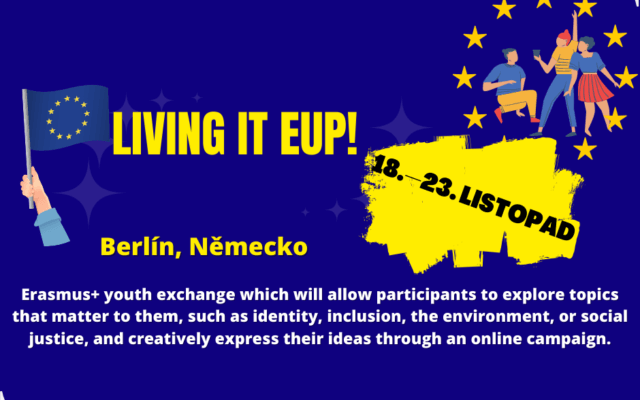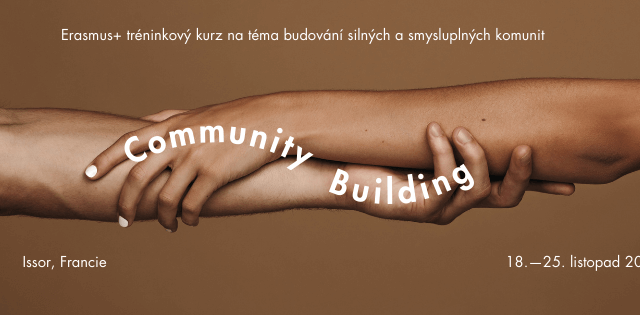ERASMUS+, Klíčová akce 1: tréninkový kurz
Termín konání: 9.—18. listopad 2024
Místo konání: Dobczyce, Krakow, Polsko
Český tým: 2 účastníci (ve věku 18+ let).
Před tím, než se přihlásíte na jakýkoliv náš projekt, důkladně si přečtěte všechny informace v sekci Chci vyjet na projekt a seznamte se s Pravidly účasti na zahr. projektech.
Pokud máte zájem se na tento projekt přihlásit, prosím důkladně si přečtete info-pack. Pokud máte zájem se na tento projekt přihlásit, prosím odešlete vyplněnou přihlášku co nejdříve.
Pro to, abyste se na tento projekt přihlásili je nutné, abyste vlastnili nejen občanský průkaz (který musíte mít ze zákona), ale také platný cestovní pas (s platností min. ještě 150 dní od datumu začátku vámi vybraného projektu).
V rámci programu ERASMUS+ jsou následující finanční specifika: v rámci všech projektů je kompletně (ze 100%) zajištěno jídlo, ubytování, aktivity, a to vše je zcela pokryto z fondů EU programu ERASMUS+ a zařízeno organizátory. Účastníkům dále budou proplaceny cestovní náklady (reimbursement) do max. výše €180 (v případě tohoto projektu) z místa bydliště do místa konání projektu a zpět.
Hostitelská organizace: Fundacja Innowacyjnej Edukacji
Popis projektu:
What You Should Expect:
The aim of the project is developing competencies of youth workers in the field of youth empowerment at local level; to act strategically towrads impactful social inclusion through the performative art of commedia dell’arte.
The training in Poland is the second training course of the long-term project The C Revolution, which aims to develop the comptetencies of youth workers in the field of youth empowerment at the local level and to act strategically toward impactful social inclusion action through the performative art of commedia dell’arte circus, and theatre of the oppressed.
Objectives:
- Developing the youth workers‘ competencies of partner organisations in the field of youth empowerment and social inclusion;
- Delivering three trainings in three different countries in Europe: Poland, Slovenia and Portugal;
- Providing European youth workers with a structured flow of knowledge-based as well as experimental and participatory learning;
- Promoting climate actions, social inclusion, tolerance, eco-lifestyle, non-formal education, Erasmus+ programme;
- Developing the networking and cooperation between partner organisations and their youth workers.
About the commedia dell’arte in social inclusion:
Key elements of commedia dell’arte:
- Promoting Social Inclusion. Commedia dell’arte workshops can bring together young people from diverse backgrounds, encouraging collaboration and teamwork. The improvisational nature of the performances requires participants to listen to and support each other, breaking down social barriers. This collaborative environment fosters mutual respect, understanding, and a sense of belonging, all of which are key components of social inclusion.
- Use of Stock Characters. The archetypal characters in commedia dell’arte (e.g., the cunning servant, the foolish old man, the boastful soldier) are easily recognizable and relatable. These characters can be adapted to reflect contemporary social issues, making them a powerful tool for discussing themes like power dynamics, prejudice, and social roles. Youth can explore different perspectives by stepping into these roles, fostering empathy and a better understanding of others‘ experiences.
- Addressing Social Issues. Through the exaggerated scenarios and characters of commedia dell’arte, complex social issues can be explored in a way that is accessible and engaging. Topics such as inequality, discrimination, and power imbalances can be addressed in a humorous yet insightful manner, making it easier for youth to discuss and reflect on these issues. The art form’s satirical nature also encourages critical thinking and challenges participants to question societal norms.
- Skill Development. Participation in commedia dell’arte can help young people develop a range of skills, including communication, public speaking, teamwork, and creative thinking. These skills are transferable to other areas of life, enhancing their employability and social mobility. For marginalized youth, such opportunities for personal development can be particularly valuable in overcoming barriers to social inclusion.
- Building Confidence and Resilience. The playful and exaggerated nature of commedia dell’arte allows participants to take risks in a supportive environment. This can be especially beneficial for youth who struggle with self-confidence or have experienced social exclusion. By engaging in this form of theater, they can build resilience, learn to cope with setbacks, and develop a stronger sense of self.
Participants‘ profile:
- active youth workers, educators and leaders (or in training to become teachers/educators/youth workers),
- communicative level of English
- 18+
- with some experience in non-formal education or/and with the international educational activities within the Erasmus+ programme
- willing to take dissemination and follow-up activities both locally (and internationally – if possible)
Selected participants are in charge of organising a local event (seminar, workshop, etc.) in their own community within a month and a half after their return from this training course.


